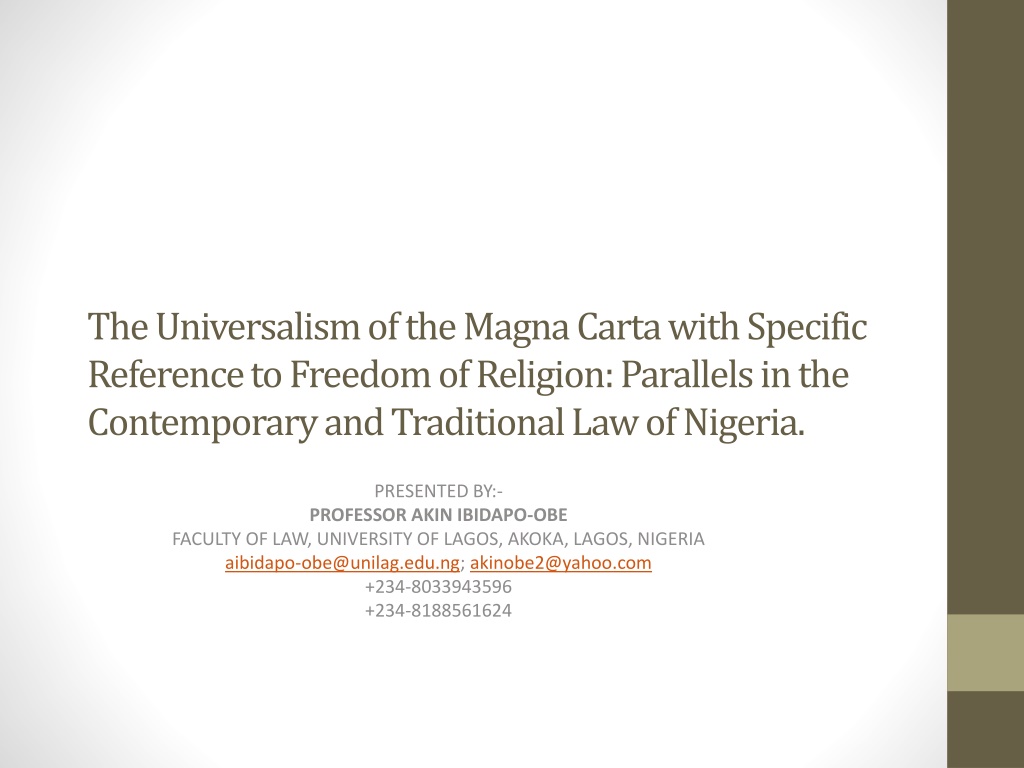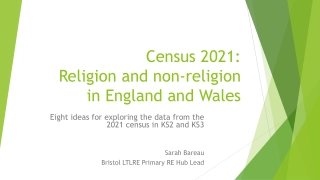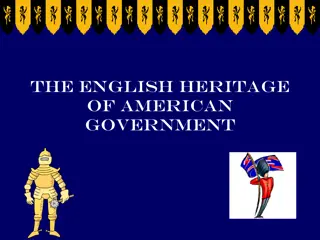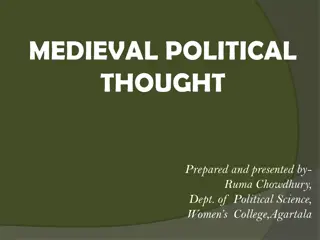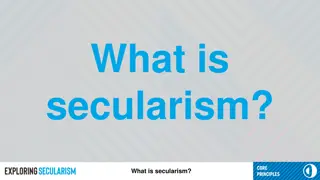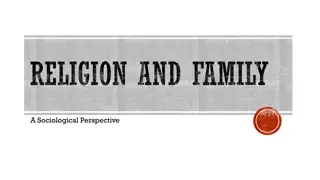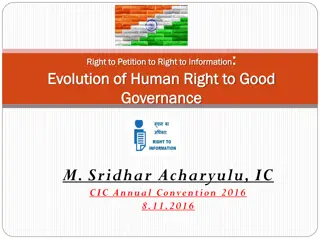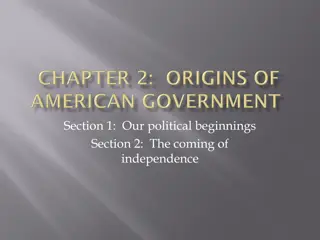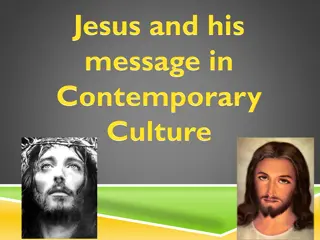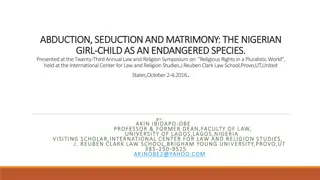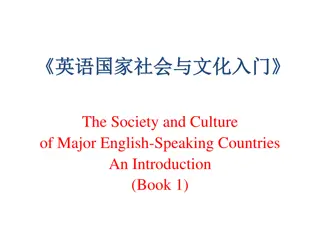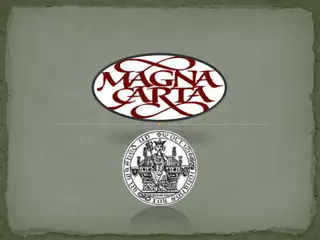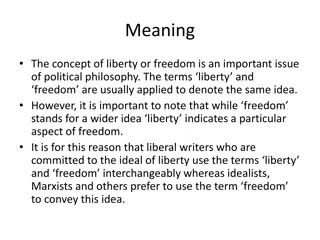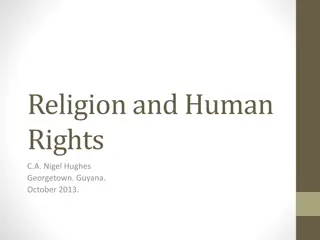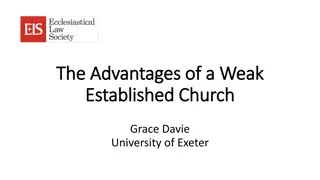The Universalism of Magna Carta: Freedom of Religion in Contemporary Nigerian Law
Magna Carta, a pivotal human rights document, is explored with a focus on its religious underpinnings and its influence on modern legal systems. The parallels and divergences between Magna Carta and Nigerian customary law regarding freedom of religion are examined. The implications of contemporary Nigerian legislation on religious freedom and the prevalence of religious conflicts are also discussed.
Download Presentation

Please find below an Image/Link to download the presentation.
The content on the website is provided AS IS for your information and personal use only. It may not be sold, licensed, or shared on other websites without obtaining consent from the author. Download presentation by click this link. If you encounter any issues during the download, it is possible that the publisher has removed the file from their server.
E N D
Presentation Transcript
The Universalism of the Magna Carta with Specific Reference to Freedom of Religion: Parallels in the Contemporary and Traditional Law of Nigeria. PRESENTED BY:- PROFESSOR AKIN IBIDAPO-OBE FACULTY OF LAW, UNIVERSITY OF LAGOS, AKOKA, LAGOS, NIGERIA aibidapo-obe@unilag.edu.ng; akinobe2@yahoo.com +234-8033943596 +234-8188561624
Introduction Magna Carta is undoubtedly the most famous human rights document in contemporary human history, the interpretations of its socially contextual provisions will be the initial focus of our discussion with particular reference to its religious antecedents. Next we will analyze the similarities and divergences between the Magna Carta and the customary law of Nigeria, with emphasis on freedom of religion Finally, we will highlight the provisions of the Nigerian Constitution of 1999 and a few other legislation that bear on the issue of religious freedom: Why have the provisions of contemporary Nigerian law fuelled, rather than quenched the raging fire of religious conflicts?
The Magna Carta And What It Represents In The Modern World The Magna Carta was a product of hard bargaining between the English monarchy, personified by King John and the feudal class in the social configuration of that time, represented by the barons. The inspirational outcome of the Great Charter for human rights philosophy was clearly an unintended consequence since its purpose was to substantially tackle the domestic grievances of the subjects of King John. McKechnie commented that though the Civil and Political Rights of Englishmen occupied a large proportion of the Magna Carta, the rights of the Religious Estate was of equal prominence
The Magna Carta And What It Represents In The Modern World The exhaustive manner of the treatment of Civil and Political rights of citizens by the Charter has no doubt impacted on the configuration of this group of rights in several human rights instruments beginning with the English Bill of Rights in 1689 Whilst the Magna Carta explored the same theme of Natural Law, here, the rulers were shorn of their divine mandate and instead made subject to Divine Law as the grundnorm against which the exercise of their powers was to be measured. Furthermore, the subject had a natural right to disobey an unjust ruler by revolt. This was the essence of the right which King John gave to freemen (in chapter 6) to subscribe to the banner of any rebellious Barons, should he, the King, breach the rights which he had bestowed on his subjects under the Charter.
The Magna Carta And What It Represents In The Modern World Could King John s concession be thus said to have presaged the Liberation Theology later to be espoused by the Catholic priests in Latin America which was under the jackboots of military Rule in the 1970s and 1980s? In several other portions of the Civil and Political rights conceded to the public, the King granted important criminal justice rights to suspects (chapter 20). In chapter 24, the power of the Sheriffs and Marshalls to sit as justices over crimes was removed thereby abiding by separation of power precepts.
The Magna Carta And What It Represents In The Modern World Apart from the general democratic doctrines pioneered in the Great Charter, the concept of a written Constitution including a Bill of Rights that the Charter represents appears to have taken root in modern governance The English Bill of Rights was promulgated in 1689, followed by the American Declaration of Independence (1776), the American Bill of Rights (1787), the French Declaration of the Rights of Man and the Citizen (1791)
The Magna Carta And Freedom Of Religion Despite its substantial focus on Civil and Political Rights in its generic connotation, there is no gainsaying the fact that the Magna Carta had deep religious undertones The very first chapter of the Charter, after the Preamble granted autonomy to the church in generous terms The components of the freedom of the English Church thereby comprised of (i) free English church and (ii) Canonical Elections.
The Magna Carta And The Traditional Law Of Nigeria Under African Traditional Religion, tolerance of the different deities is a necessary and inherent attribute. There was a clear separation of the political and religious estates in African Traditional Religion that was strictly observed. Using the Yoruba example, many of its communities had in the course of their evolution separated the political from the religious to enhance checks and balances. If the political leader or Oba should err, the sanction would invariably come from the priestly estate, who imposed deserved sanction on the monarch. This is similar in the way that the church in England, in an ideal situation, retained moral powers of censure on the reigning monarch, where necessary.
The Magna Carta And Freedom Of Religion Under Contemporary Law Section 10 of both the 1979 and 1999 Constitution of Nigeria provides that: The government of the Federation or state shall not adopt any religion as a state religion . Implied is the recognition of a society with a multiplicity of religious beliefs and a desire by the framers of the Constitution that none of these religions should be adopted as a state religion. However, in Nigeria, its exact meaning has been shrouded in a mist of religious bigotry and deliberate falsehood.
The Magna Carta And Freedom Of Religion Under Contemporary Law The issue of the proper interpretation of secularism or multi- religiosity is however tangential. The core of the problem is and always has been the extent to which the Nigeria State should involve itself in religious affairs. It is suggested that Nigerian Government needs to imbibe the ideal fostered by the Magna Carta when King John Voluntarily pledged to allow the Church of England to run its own affairs and conduct canonical elections without intervention by him.
Religion and the School System Section 38 of the 1999 Constitution has two apparently conflicting provisions on religious instructions in schools. In one breath, the Constitution in section 38(2) forbids the compulsion of any school pupil to participate in religious activities other than his own; In another breath, the Constitution in section 38(3) asserts that religious bodies shall be free to provide instructions in such institutions. The way out of this confusion, in our respectful view is to ban religious instruction altogether in all schools, whether established by government or by religious bodies.
Sharia Law, The Nigerian Constitution and Human Rights The re-introduction of Sharia Law into the Nigerian legal system alarmed many Christians who had perceived a definite bias by the Nigerian state for Islam The reintroduction of Sharia is being justified on the grounds, that true Muslims must live in a religious order, that the constitutional guarantee of Freedom of religion allows them to do so, that the implementation of sharia law would obviate the prevalence of negative social vices and immorality. Generally, the law introduces the harsher penalties of Islamic criminal law for theft and robbery (amputation of the right hand); murder (retaliation and compensation), and immoral behavior such as adultery and prostitution (death by stoning), drinking of alcohol (caning).
Sharia Law, The Nigerian Constitution and Human Rights In terms of its effect on the court system there are - Sharia courts, Upper Sharia courts, and Higher Sharia courts. All three levels have jurisdiction on civil litigation involving Muslims and in criminal proceedings if the accused is a Muslim. However, a non-Muslim may accept the jurisdiction of the Sharia court in specific proceedings. One of the problems, which have emerged under the Sharia Law System, is the issue of enforcement. The Police Force is under federal control and non-Muslims officers are often reluctant to enforce Islamic laws on adultery, alcohol consumption etc.
Sharia Law, The Nigerian Constitution and Human Rights Vigilante groups called Hisbas , have therefore emerged as enforcers of Islamic law with the lack of discipline and control often associated with vigilante groups. In a multi-ethnic setting, such enforcement by Islamic vigilante has sparked ethnic/religious confrontation. Specific issues have been raised on whether the Sharia Law System aligns with the Nigerian constitution. Section 1(3) of the 1999 constitution provides that if any law is inconsistent with the constitution, such law shall be null and void to the extent of its inconsistency.
Conclusion Even though the Magna Carta originated from an intimidated monarchs response to volatile civil uprising, its key elements have somehow or the other fired the imagination of freedom seekers all over the world, leading to an extrapolations of its basic provisions on separation of church and state and civil and political rights to encompass the plentitude of all fundamental rights. After comparing the Magna Carta to African Traditional Religion, we have seen that the values of tolerance between religions and checks and balance of monarchial power by the priestly institution provides a point of congruence despite diversity of time and space.
Conclusion With regard to the contemporary law of Nigeria, there are various parallels to be drawn- Natural Law as basis for human rights, the essential autochthony of human rights as deriving from people power , the rule of law and separation of powers, suspects rights within the criminal justice system and the idea of the written Constitution. On the issue of religion, we found that it was the subversion of these hallowed principles of human rights by religious vested interests that has precipitated ultimately the present terrorism of the Boko Haram sect. religious conflicts and
